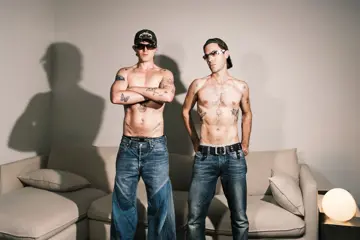Directed by Isaac Drandic, and written by and starring Meyne Wyatt, City Of Gold ties together humour, grief and tragedy to represent the Aboriginal experience in early 21st century Australia.
Breythe (Meyne Wyatt) wants to be a successful actor while staying true to his Wongutha roots. Breythe’s brother, Mateo (Mathew Cooper), sister, Carina (Shari Sebbens), cousin, Cliffhanger (Jeremy Ambrum) and father (Maitland Schnaars) are explored individually and in relation to Breythe, and an ensemble of non-Aboriginal characters are played by Anthony Standish and Christopher Stollery.
The play gains traction when Breythe returns home after tragic news and the audience is thrown into the middle of the political and racial tensions rife in Kalgoorlie. The tension between Kalgoorlie’s Aboriginal and non-Aboriginal population is immediately made explicit. What’s not made explicit, however, is the way time works in this play. The lines between the past, the present and the future blur beautifully – though the distinction between them could have been made more obvious through visual cues like lighting, which changed inconsistently, or costume.
The dialogue felt natural, the drama and melancholy interspersed with humour – either to highlight the racism affronted by the non-Aboriginal characters or as a coping mechanism for the Aboriginal characters. Toward the beginning of the play, Carina says, “We fight for our lives because you keep taking them.” This line resonates throughout the play as each character is forced to fight for the right to live and survive in Kalgoorlie, on their traditional land, free of racism, discrimination and judgement. The second act opens with a lengthy and powerful speech by Breythe about the tokenism, racism and discrimination faced by Aboriginal people, particularly those in the public eye such as Adam Goodes. The speech was honest, raw and delivered beautifully by Wyatt, but could have been tightened to make it more succinct and punchier.
Read More: How Meyne Wyatt Processed His Grief At The Loss Of His Father By Writing City Of Gold
Don't miss a beat with our FREE daily newsletter
City Of Gold managed to show the diversity among Aboriginal people where no two Aboriginal characters have the same opinions, political views or personal values, and their different perspectives are often the cause of conflict. The inclusion of a disabled character added another layer to the story. Cliffhanger, Breythe’s deaf cousin, is a caring friend and a staunchly loyal family member, even when knocked back by Mateo’s aggressive ideal of masculinity. He’s a prime target for discrimination in the play but is played by Ambrum with sensitivity and humour, showing the audience that Blakness and disability don’t have to be played at a deficit.
Carina is the sole female character in City Of Gold and is often silenced by the men in the play. She is a prime example of how Aboriginal women are often deemed ‘wild’ or ‘angry’ for merely voicing their opinions. Despite this, or perhaps because of it, Carina stands tall as one of the strongest characters: she’s a caring sister, daughter and mother, an activist and a growing matriarch, and her lines stay with you long after the play is over.
The negligence Aboriginal people face at the hands of non-Aboriginal authorities, from doctors to the police, lingers in the spirit of this play. At its conclusion, the audience is left with the horrifying truth of what it means to be Aboriginal in Australia today, and they are left with an unspoken question: what are we going to do about it?















